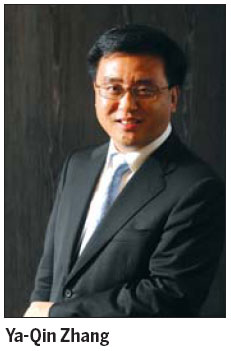No question about it - China has arrived
Updated: 2011-09-15 07:49
By Ya-Qin Zhang (China Daily)
|
|||||||||||
There's no question about it: we do live in an uncertain economic climate. But, one thing that is not uncertain is that companies that ignore China's innovative ability and role in global economic recovery do so at their own risk.
It was no accident that Microsoft chose Zhongguancun and Haidian Science Park as the site of its Asia-Pacific R&D headquarters, with its more than 3,000 top-caliber scientists and engineers. It's the largest such investment Microsoft has made outside the United States.
Again, there's no question that China's moment has arrived. And the IT industry is helping to propel it forward and is an engine for global growth.
There are a number of things that make China an innovation center -- things that promise to have a considerable influence on future generations.
Some 20 years ago, when Microsoft first moved into Zhongguancun, there was no evident promise of its future relevance or impact. It was still an early idea shared by Bill Gates, Microsoft's founder, Microsoft itself, the Chinese government, and the Haidian Science Park, China's first State-recognized high-tech zone - that, one day, the district would prove to be a catalyst for world-class, China-based innovation and growth.
Today, the park is home to multinational R&D centers such as Microsoft, Intel, IBM and Google; and leading home-grown brands such as Lenovo, Baidu, Alibaba, Sina, Tencent and Sohu.
IT engine for growth
New technologies -- in particular, new business models related to software, mobility, and the Internet -- provide a strong platform for innovation that will help accelerate economic recovery. And technology will continue to play a major role in creating jobs and efficient ways to fuel global economic growth, especially devices and cloud-based services that help organizations and individuals be more productive, entertained, or well-off.
Talent base

China is fast becoming a science and technology powerhouse. Its huge numbers of science and engineering graduates (1.5 million, in 2006, for example) offer an unequaled talent base for future R&D. Microsoft and the Haidian Science Park have long relied upon, and benefited from, the students and graduates of nearby universities and research institutes such as Peking University, Tsinghua University and the Chinese Academy of Sciences.
Collaboration a driving force
China's investment in R&D will soon amount to more than $100 billion a year. This, combined with contributions from local industry and multinationals such as Microsoft, will have a huge effect. In 2011 alone Microsoft outsourcing put more than $216 million into the local ecosystem.
Beyond investment, the sharing of best practices, the mentorship, and start-up culture in China is beginning to replicate the unique chemistry of California's Silicon Valley. Having a proximity to places such as Zhongguancun's Haidian Science Park, which encourage collaboration, is invaluable in building an innovative economy in China.
Microsoft is committed to helping local industry achieve its full potential, and that includes working with the local government as it builds an intellectual property rights protection system.
This may be one of the single biggest challenges currently facing the industry, but it is one that can assuredly be overcome.
Sina, Tencent and Sohu.com are emblematic of the development and changes that will help China's IT innovation lift the world economy out of its current decline.
The author is corporate vicepresident of Microsoft and chairman of the Microsoft Asia-Pacific R&D Group
(China Daily 09/15/2011 page18)